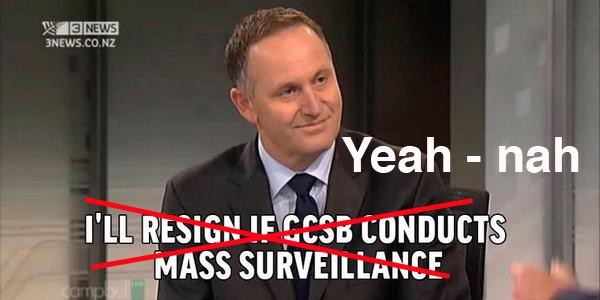According a
recent Herald-Digipoll
28% of New Zealanders don’t have confidence in our intelligence services. It will be good if their concerns are elaborated in submissions to the government’s intelligence and security review,
scheduled to begin next month and run through until February
.
The review’s
terms of reference
require “a wide range of members of the public [to] have the opportunity to express their views on issues relating to the review.”
The review topics include current intelligence legislation, oversight arrangements, and how our courts deal with classified information. Mentioned for special attention is the Countering Terrorist Fighters legislation, critical provisions of which expire in March 2017.
The terms of reference should have included the controversial issue of whether New Zealand should remain a member of the US-run Five Eyes intelligence network. This issue will no doubt be raised in relation to one of the specific terms of reference, namely “whether the definition of ‘private communication’ in the legislation governing the GCSB is satisfactory.”
Currently, the definition of private communication
in the GCSB Act
poses a “Catch 22” question. This is because the present definition specifically excludes a communication “in which any party ought reasonably to expect that the communication may be intercepted by some other person.” Given the Five Eyes network (of which the GCSB is a part) is well on the way to being able to intercept any electronic communication, can any phone call, text or email be considered private in terms of the GCSB Act? If not, does this give the GCSB a green light for mass interception of electronic communications without needing to get a warrant?
While the review will provide a platform for critics of our intelligence legislation I would be surprised if the panel comes out with any radical reform proposals. I say this because of who the government has chosen to conduct the review, Sir Michael Cullen and Dame Patsy Reddy.
Sir Michael is an “insider” rather than someone coming from the outside and looking at the issues with fresh eyes. Sir Michael was in charge of the intelligence services on several occasions as Acting Prime Minister when Helen Clark was overseas. For all nine years of the Labour-led government Cullen was on the Intelligence and Security Committee, a toothless oversight body that met for less than one hour a year during Sir Michael’s tenure. I found this out through Written Parliament Questions when I was an MP.
In the 2006 parliamentary debate
on the House appointing Sir Michael and two others to the five-person committee, I pointed out that the committee had only met for 43 minutes the previous year – enough time for introductions, a very brief briefing and a nice cup of coffee. Sir Michael did not criticise this sad state of affairs.
Thankfully the review’s terms of reference single out “oversight arrangements” as an area meriting a comparison between New Zealand and overseas “best practice”. While there are glaring problems with oversight bodies in most Western nations, New Zealand still has the weakest regime. US Congressional committees have been criticised for their timid response to the Snowden revelations, but they do interrogate the intelligence chiefs in public hearings and in December the Senate intelligence committee issued a
stinging report on the CIA’s torture practices.
Finally, our review panel is handicapped by the absence of a human rights lawyer. Cullen’s partner on the review panel, corporate lawyer Patsy Reddy, has the skills to review governance practices within the spy agencies, but the panel also needs a lawyer specialising in civil liberties. Without such a person it will be difficult for the panel to properly assess public submissions proposing changes to the legislation governing the SIS and GCSB to better protect our individual rights and privacy.
